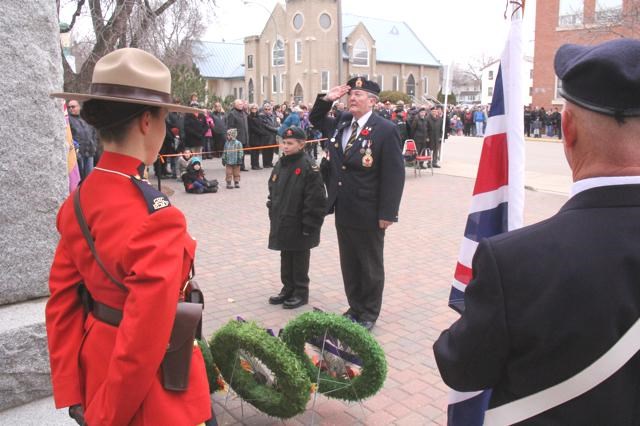Two seemingly separate occurrences have come together just before Remembrance Day that shows how wartime experiences can touch many lives, even decades after the war is over.
Weyburn writer Connie Regier composed a poem recently in the voice of herself as a seven-year-old girl, talking about a father she never knew because he had been at war. She recited it while speaking at the Weyburn Public Library recently, where Mayor Marcel Roy heard it, and he passed this along to Connie Nightingale, the manager of the Weyburn branch of the Royal Canadian Legion, as a possible feature for the Remembrance Day service on Monday, Nov. 11.
Nightingale contacted Regier, who came down to the Legion to share the poem with her, and a strange coincidence came to light at that time.
Unbeknownst to Regier, a young man found a stack of papers, notes and letters while renovating a wartime house on King Street, and seeing some of the letters were from wartime, they were brought to the Legion just the day before.
As it turns out, the letters had been sent by Regier’s father, Cpl. Sidney John Robert Wilson, and this shocked and surprised Regier as she had no idea the letters were in her former residence, assuming her sisters may have taken them.
The discovery of her father’s letters and reading his longing to see his wife and family again was a very emotional one for Regier, who is still trying to wrap her head around it, and is more than a little surprised that the story is now spreading through media outlets in the days leading up to Remembrance Day.
“This story is bigger than me, with the fellow who brought the letters to Connie at the Legion. I just feel like I’m being blown along by the wind,” she said, noting she penned her poignant poem before she ever found out that her father’s words from war were about to be found.
As Regier described the poem, she had been thinking that she would like to be able to make a difference in the world, and in her mind’s eye, she pictured a young girl speaking the poem to her.
As she read it over later, she realized this was herself, expressing her own feelings at the age of seven about a father who had been gone to war for five years, and her struggle to understand why he was gone.
The War
Father is leaving us
To fight the bad guys
Mother cries
I am too young to know
Where the bad guys live
Mother teaches me
Our father art in England
Neighbours crane their necks
Uniforms in the street Father is here!
Mother reaches out, hugs
Father’s duffle bag shed
From his shoulder
Hiding behind the stuffed chair
I’m seven and know enough
Not to talk to strangers.
“This little child is telling me exactly what I was feeling, that father’s leaving to fight the bad guys, and mother’s crying. She doesn’t know where the bad guys live,” said Regier, who will be reading the poem at Weyburn's Remembrance Day ceremonies to be held on Monday, Nov. 11 at the Legion Hall. The ceremonies will be different this year in that all of it will take place indoors in the hall, including the laying of the wreaths, the moments of silence and the address by pastor Victoria Mwamasika of Zion Lutheran Church.
She was later told that an editor wanted to send her poem to the War Amps magazine, and Regier said she only then realized the editor had seen that children’s scars or wounds are on the inside.
“I’m just a catalyst in this, and obviously it’s bigger than me. I didn’t want to fac this, because it’s so emotional,” she said, recalling as a young girl she would see other children walk hand-in-hand with their fathers, something she missed out on.
Regier noted her parents lived in the wartime house for the remainder of their lives, with her mother living there until she was 97 years old. Her family had seven children, with Connie as the oldest, and her brother was a newborn when her father left for war to fight in the infantry. Her other sisters were born after the war.
Connie’s father never marched in parades with his medals, even on Remembrance Day, and didn’t speak of his experiences to most people — but he did talk to her as the oldest child, and told her, “There are no good guys in a war.”
As Cpl. Wilson said in one of his letters, while she longed for her father, he was longing for his family.
One letter written on New Year’s Eve of 1944 spoke of this longing: “I have been thinking about you and the kids all day and wishing I was spending this new year with you, and wondering how many months would go by in 45 before I was with you; not many, I hope. I was showing the people your picture and the kids. They think the kids are swell and say it’s a shame that I’ve been away from you and them so long. All my love Darling, love to the kids, your Sid, I miss you honey, Dad XOXO.”



